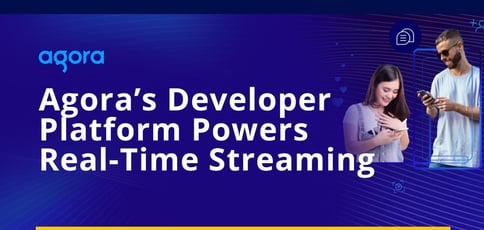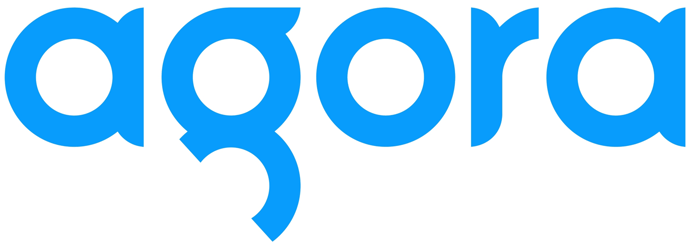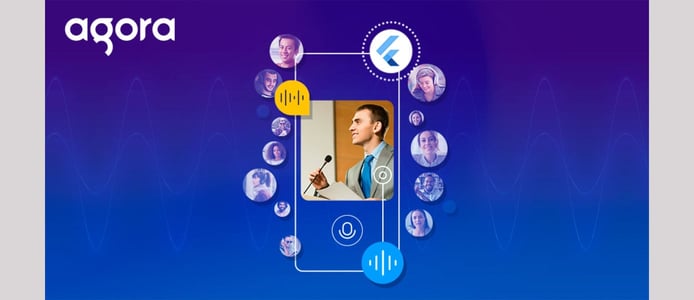
TL; DR: Despite the popularity of all-inclusive apps like Zoom and Skype, developers often benefit from unbundling the elements of a communications platform. Agora has capitalized on this truth by offering a series of APIs for voice, video, and streaming — all supported by robust network infrastructure. The company effectively reduces cost and complexity for tech entrepreneurs seeking rapid market entry. Ever committed to helping startups, Agora offers users parts of its platform at no charge.
Whether used to support remote workforces or enhance international communication, we’ve become accustomed to some pretty advanced video streaming technologies in recent years. But back in 1997, when Tony Zhao worked as a founding engineer at WebEx, things were radically different.
“Everyone was trying to build the first generation of apps for voice and video conferencing in those early days,” said Virginia Liu, Senior VP of Marketing and Ecosystems at Agora, which Tony later founded. “Tony was frustrated with the networking infrastructure because it inhibited the end-user experience. That’s when he decided to build a solution that would be better for everyone.”
Instead of an app, Tony built a platform enabling developers to create their own voice and video conferencing experiences. Agora experienced steady growth until 2020, when pandemic-related social distancing led to a dramatic increase in sales.

Agora’s real-time engagement platform allows developers to embed voice and video in any application.
“Everyone realized that we desperately need a way to facilitate human-to-human connections in a virtual format,” she said. “As a result, we saw a lot of really different use cases spring to life last year.”
Today, Agora empowers developers to embed voice and video services within any application or device. The platform supports voice and video calls, interactive live streaming, video recording, and real-time messaging. According to the company’s website, Agora now powers more than 40 billion minutes of human connections each month.
The company’s pay-as-you-go pricing model makes for predictable billing: The first 10,000 minutes are free, with discounts offered based on the total volume of minutes consumed. Agora also offers customized solutions for organizations like telehealth providers that are subject to HIPAA privacy regulations.
The Case for Unbundling App Design
Agora’s SDKs allow vendors to build upon a solid framework rather than develop the technology independently. As a result, they can focus on creating bespoke products centered on a range of use cases.
“The trend in this space is the unbundling of services,” Virginia said. “People are using products like Zoom and Skype for all sorts of purposes — for example, learning yoga — that the interfaces of those tools aren’t designed for. With Agora, we’re seeing more verticalization and application design based on specific use cases.”
By breaking all-purpose communications technology into pieces, a developer or tech entrepreneur can focus on what is most important: delivering an intuitive user experience void of bells and whistles.
Take a virtual dance training app, for instance. Such an app would likely be optimized to cast an instructor’s video stream to students. It could have an option to allow the instructor to assess the techniques of students by viewing their camera. Such an application wouldn’t, however, require a virtual whiteboard tool, screen sharing, or group video conversations. Using Agora, a developer could remove those features, in turn simplifying the user interface and flattening the learning curve.
Virginia told us that users are attracted to Agora because it enables frictionless communication. Low latency video is essential for streaming high-definition videos and providing gamers with sub-second player response times. To address such needs, Agora reduces latency through robust server infrastructure and consistent throughput at scale.
“Today’s video conferencing apps must be scalable, whether you’re accommodating one-to-one calls or audiences of up to 1 million participants with one active host,” Virginia said.
The Benefits of Reduced Complexity
Over the years, user interface design has transitioned from an art to a science. The best practices in this space are so well-established that even the U.S. government has issued a set of web design principles.
Many user interface guidelines focus on reducing complexity. Apps that provide a simplified user experience typically enjoy better adoption rates, whereas those cluttered with unnecessary tools confuse and push users away.
Streamlined design principles also boost developer productivity. The more modular the framework, the faster a small or cash-strapped dev team can bring a minimum viable product to market. That’s why Agora employs flexible building blocks in the form of a customizable UI, extensive APIs, and built-in third-party extensions. These tools help entrepreneurs quickly capitalize on opportunities in underserved niches.

Agora unlocks a wide range of engagement possibilities.
“We’re trying to make it easy for any developer leveraging any language platform and targeting any device to use Agora,” Virginia said. “We’re also working on a completely no-code solution that allows anyone to build a video application regardless of coding skills. It’s a drag-and-drop wizard you build yourself. You can even add advanced features like recording and transcription to your application.”
Agora isn’t the only player in this space. The open-source framework WebRTC supports real-time communication protocols that users can easily embed into websites and applications. WebRTC standards function as Javascript API calls; all major browsers support the standard. However, it’s the developer’s job to manage application scaling.
“I know a lot of people who want to use WebRTC to build their own application,” Virginia said. “What we’ve done is eliminated the complexity of WebRTC. You don’t have to figure out hosting solutions or media-server scaling.”
Real-Time Engagement for Voice and Video Streaming
In the past, developers typically optimized video conferencing apps for corporate presentations. The resulting apps were great for the boardroom — but didn’t always work well outside of a business setting.
To avoid such a problem, Agora isolates the pieces of a standard communications platform and makes them available as APIs. That way, developers can select the real-time engagement services that make sense in any given use case. And they can do so in a manner supported by Agora’s powerful under-the-hood network of servers.
This piecemeal approach is a win for all parties: Developers get their innovations into the market faster, and users won’t get bogged down with unnecessary audio and video tools.
As for what the future holds, Agora is determined to actively support the next generation of entrepreneurs.
“We’re offering the first 10,000 minutes each month for free so that they can launch apps more quickly. You don’t even need to hand us a credit card.” Virginia said. “We also launched a program designed to help bootstrapped startups with up to 1 million free minutes and other perks.”
Agora’s fast server infrastructure and easy-to-use APIs, combined with its generous pricing model, make the platform an obvious choice for entrepreneurs and app developers alike. Best yet, they don’t have to invest in the technology required to serve a global user base. This kind of flexibility is advantageous as tech companies adapt to a post-pandemic world.
“A lot of the use cases that we envisioned in the early days came to life in 2020,” Virginia said. “It’s not just about video conferencing — it’s about touring the world virtually, taking online cooking lessons, and attending digital yoga classes. And Agora serves this evolving market quite well.”
HostingAdvice.com is a free online resource that offers valuable content and comparison services to users. To keep this resource 100% free, we receive compensation from many of the offers listed on the site. Along with key review factors, this compensation may impact how and where products appear across the site (including, for example, the order in which they appear). HostingAdvice.com does not include the entire universe of available offers. Editorial opinions expressed on the site are strictly our own and are not provided, endorsed, or approved by advertisers.
Our site is committed to publishing independent, accurate content guided by strict editorial guidelines. Before articles and reviews are published on our site, they undergo a thorough review process performed by a team of independent editors and subject-matter experts to ensure the content’s accuracy, timeliness, and impartiality. Our editorial team is separate and independent of our site’s advertisers, and the opinions they express on our site are their own. To read more about our team members and their editorial backgrounds, please visit our site’s About page.

